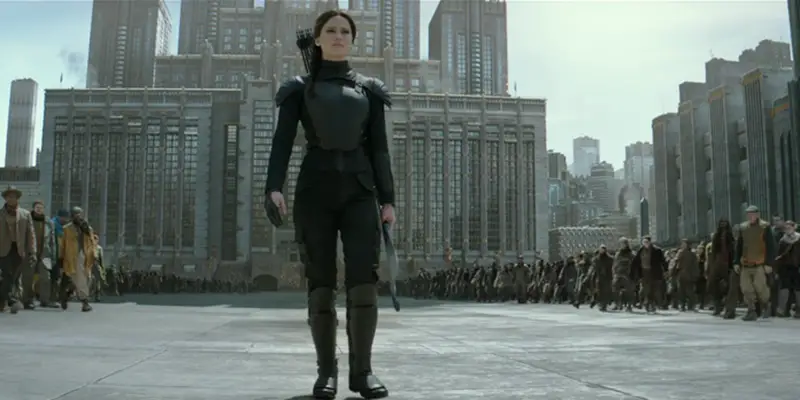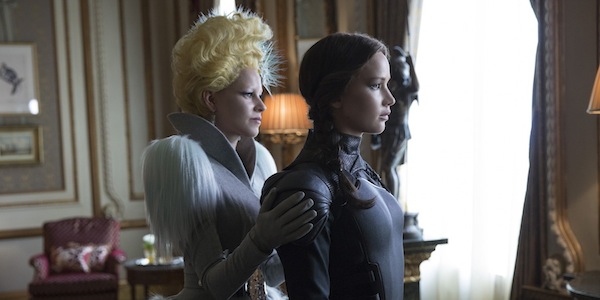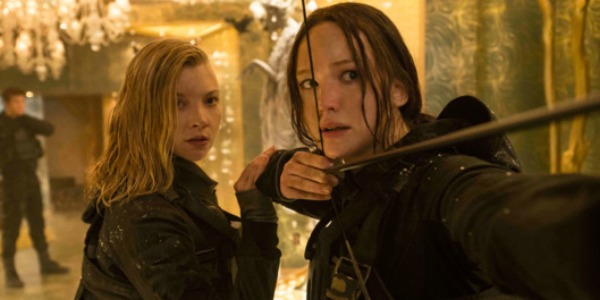THE HUNGER GAMES MOCKINGJAY PT. 2: A Conclusion That Manages to Both Satisfy and Disappoint

Alistair is a 25 year old writer based in Cambridge.…
Although initially derided as nothing more than a rip-off of similar dystopian novels (and their subsequent film adaptations) The Running Man and Battle Royale, author Suzanne Collins saw her book series become increasingly popular due to how it tied in with the contemporary societal fear of graphic violence co-existing with inane entertainment.
Collins devised the idea for her original 2008 novel whilst at home channel-surfing, with the image of a bleak reality showcased by war reports on news channels making an uneasy bedfellow with the artificial reality of TV talent competitions.
A dystopian fantasy that now closely resembles our reality
As the adaptation of the final chapters in Collins’ trilogy closer Mockingjay Part 2 makes its way to the big screen, it is less than a week after the world was left horrified by images of terrorism in Paris. Televised globally, the horrors and their international response caused broadcasters across the planet to change their schedules and show one of the major cities in Europe being turned into a battlefield.
As the world still tries to grasp the events, with the debate on whether or not it is ethical to shoot to kill when it comes to suspected terrorists still raging on, Mockingjay Part 2 makes for surprisingly uneasy viewing.

A PTSD-riddled Katniss Everdeen (Jennifer Lawrence) and her rebel allies are now storming into the capitol under instructions to kill President Snow (Donald Sutherland), with the debate on whether or not to kill innocent citizens just for living happily under his command forming the moral backbone of the film.
Snow may be the villain, but in copying his actions and contemplating killing innocent people to ensure his tyranny ends, Mockingjay is an alarmingly (often thrillingly) ethically ambiguous film. Blockbuster movies have a tendency to spoon-feed the audience what emotions they should be feeling; The Hunger Games franchise hasn’t received the amount of credit it deserves for managing to balance the thrills you would expect from a tentpole blockbuster all whilst making you question the emotional motivations of everybody onscreen.
I was confused about the mass audience complaints about the lack of action in the first half of the Mockingjay adaptation last year. The entire film was drained in a tension that feels somewhat lacking in the earlier stages of Part 2, even as it follows directly on from moments after the close of Part 1. Even as the second half delivers the action to appease audiences not entertained by the biting media satire of its predecessor, it feels like director Francis Lawrence is delivering spectacle in spite of himself.
Whereas the first film he directed for the franchise, sequel Catching Fire, was remarkable at balancing a deeper exploration of Panem’s political mindset with exceptional action set pieces, he has subsequently shown he has more investment on both the socio-political context and the intimate character moments than on the bigger sequences.
An action movie that wants to be anything but
The half-hearted direction of sequences as the District 13 gang infiltrate the capitol and fall into a plethora of traps is annoyingly reminiscent of sequences in mediocre YA-adaptation The Maze Runner (and appearances of zombie-type creatures in the later stages instantly brings the recent sequel The Scorch Trials to mind). The Hunger Games is the best contemporary teen franchise, as it has heart and intrigue. It’s strange how, for a film with an action-based premise, the action scenes feel shoehorned in and fairly uninspired, making it seem cut from the same cloth as its low-budget, low-talented imitators.
The franchise is also a cut above its imitators by regularly provoking strong performances across its entire ensemble cast. Here, the theatricality of the reality competition is fully gone, with only a brief cameo from Stanley Tucci’s games host Caesar Flickerman offering a brief excursion into pantomime that has otherwise been fully vetoed in favour of a brooding atmosphere. This means that as Katniss, Lawrence delivers another performance defined by its quiet intensity.
I’ve previously stated that, whenever Katniss cries, Lawrence never looks believable in her performance – but this isn’t a criticism. She is such a strong, ambiguous character, defined by her stern expressionlessness now that she is suffering from crippling PTSD, that whenever she shows emotion it feels like the only time in the franchise the filmmakers are trying to spoon-feed our emotional reactions.

The problem is that Katniss is faced directly against President Snow, a previously sidelined character who acts as the main villain; as written he is easily detestable, but without being developed enough to be truly monstrous. The motivations of our heroes are ambiguous, making our time with them nothing less than thrilling; we never learn why Snow is fighting for the blood-lust of the hunger games in the first place, with the games now acting more as a Chekov’s Gun to inspire revolution rather than anything that makes sense in the narrative universe.
Mockingjay Part 2 does suffer a little from Return of the King syndrome – including multiple endings to tie up loose ends in a franchise defined by its ambiguity. The overarching love triangle between Katniss, Peeta (Josh Hutcherson) and Gale (Liam Hemsworth) has always been the most tedious element, considering it plays out against the backdrop of a revolution. Ending the franchise with its resolution is undeniably anticlimactic, with the events that happen to Panem as a whole being sidelined once there are no more action sequences to deliver. It is an infuriating, fan-service ending to a quadrilogy that has never sunk to the level of appeasing base audience desires in favour of being something more interesting.
Conclusion
Mockingjay Part 2 is a satisfying conclusion overall, with the franchise as a whole being so satisfying within the dismal dystopian YA genre that it only feels disappointing considering what has come before. It is going to be a long time before any franchise achieves this amount of popularity, and all whilst balancing out the action with well-developed characters and thematic elements that dare the desired young target audience to question the foundations of their own reality.
Which are the best and worst closing entries to a franchise? What are the best YA franchises?
The Hunger Games: Mockingjay Part 2 is in cinemas in the UK and US now. All international release dates are here.
Does content like this matter to you?
Become a Member and support film journalism. Unlock access to all of Film Inquiry`s great articles. Join a community of like-minded readers who are passionate about cinema - get access to our private members Network, give back to independent filmmakers, and more.
Alistair is a 25 year old writer based in Cambridge. He has been writing about film since the start of 2014, and in addition to Film Inquiry, regularly contributes to Gay Essential and The Digital Fix, with additional bylines in Film Stories, the BFI and Vague Visages. Because of his work for Film Inquiry, he is a recognised member of GALECA, the Gay & Lesbian Entertainment Critics' Association.













